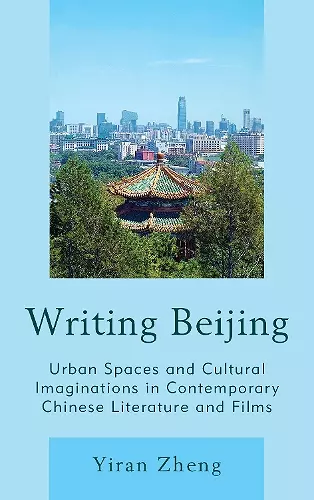Writing Beijing
Urban Spaces and Cultural Imaginations in Contemporary Chinese Literature and Films
Format:Paperback
Publisher:Bloomsbury Publishing PLC
Published:11th Sep '17
Currently unavailable, and unfortunately no date known when it will be back
This paperback is available in another edition too:
- Hardback£78.00was £78.00(9781498531016)

One of the oldest cities in the world, Beijing was an imperial capital for centuries. After the founding of the People’s Republic of China in 1949, Beijing became not only the political center of the new communist country, but also the signifier of socialist ideol-ogy and revolutionary culture. Now, in the 21st century, Beijing embodies global conflicts and global connections. Over the course of the last century, then, Beijing moved from the quintessential “traditional” capital to the symbol of communist urban form and finally to a cosmopolitan metropolis. These three stages in the history of Beijing and its shifting representations are the topic of this study.
Like other capitals, Beijing is much more than its physical entity. It also functions as a concept, a representation. As city planners have (and continue to) present Beijing to the world as a model, the fluctuating images of Beijing have become solidified in urban space. Today, the urban form of Beijing juxtaposes diverse spaces that span centuries, embodying the various representations of the city by its planners in different eras. These representations of space also provide possibilities for writers to rethink and rebuild the city in their literary works. Chinese writers and filmmakers often essentialize those urban spaces by making them symbols of different urban cultures, the old houses representing “traditional,” “patriarchal” Chinese culture while soviet-style buildings reflect revolu-tionary culture. Finally, the more recent sprouting of apartments, condos, and townhouses stands for the invasion of western modernity and provides evidence of global capitalism in contemporary China.
Inspired by Henri Lefebvre, this study establishes a framework that connects urban spaces (representations of space) to writers and literary productions (representational space). I analyze the three major urban spatial forms of traditional, communist, and glob-alized Beijing and examine what these urban spaces mean to Chinese writers and filmmakers as well as how they use them to configure particular images of Beijing. I argue that these different configurations are actually the projections of those writers and filmmakers’ own cultural imaginations; they provoke a form of emotional catharsis and also produce alternative visions of the cityscape.
Writing Beijing makes a remarkable contribution to the growing cultural studies of Chinese cities. Zheng not only engages in insightful discussions of the urban spaces of Beijing, including the important yet hitherto neglected military compound, but also provides exciting new interpretations such as “gendered city.” With its breath and clarity, this book would be an essential reference to anyone interested in Chinese cities, Chinese literature, film and society. -- Yanjie Wang, Loyola Marymount University
This book makes a substantial contribution both to urban study and literature and film studies. It has provided a superb model which connects city, people, and cultural production together. By exploring how urban space is reconstructed by political power and global capital, and revealing subtle relationships between reality and imagination of a city, it opens up important debates for further consideration. -- Dongfeng Tao, Capital Normal University, Beijing
ISBN: 9781498531030
Dimensions: 230mm x 150mm x 13mm
Weight: 259g
150 pages